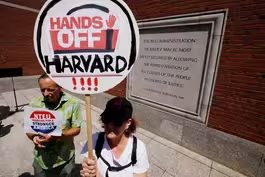
How future workers will adapt as AI reshapes jobs
Clip: 9/3/2025 | 6m 57sVideo has Closed Captions
How the next wave of workers will adapt as artificial intelligence reshapes jobs
AI is reshaping the workplace as companies are turning to it as a substitute for hiring, raising questions about the future of the job market. For many, there is uncertainty about the jobs their children will have. Robert Reich, the Labor Secretary under President Clinton and professor at Berkeley, joined Geoff Bennett to discuss his new essay, "How your kids will make money in a world of AI."
Problems playing video? | Closed Captioning Feedback
Problems playing video? | Closed Captioning Feedback
Major corporate funding for the PBS News Hour is provided by BDO, BNSF, Consumer Cellular, American Cruise Lines, and Raymond James. Funding for the PBS NewsHour Weekend is provided by...

How future workers will adapt as AI reshapes jobs
Clip: 9/3/2025 | 6m 57sVideo has Closed Captions
AI is reshaping the workplace as companies are turning to it as a substitute for hiring, raising questions about the future of the job market. For many, there is uncertainty about the jobs their children will have. Robert Reich, the Labor Secretary under President Clinton and professor at Berkeley, joined Geoff Bennett to discuss his new essay, "How your kids will make money in a world of AI."
Problems playing video? | Closed Captioning Feedback
How to Watch PBS News Hour
PBS News Hour is available to stream on pbs.org and the free PBS App, available on iPhone, Apple TV, Android TV, Android smartphones, Amazon Fire TV, Amazon Fire Tablet, Roku, Samsung Smart TV, and Vizio.
Providing Support for PBS.org
Learn Moreabout PBS online sponsorshipGEOFF BENNETT: A.I.
is rapidly reshaping the workplace.
More companies are turning to it as a substitute for hiring or retraining workers.
And that's raising urgent questions about the future of the job market.
For many families, the uncertainty can feel personal.
What kinds of jobs will their children or anyone entering the work force years from now actually have?
Robert Reich is a professor of public policy at University of California, Berkeley, and the former labor secretary under President Bill Clinton.
And he wrote about this recently in his Substack essay titled "How Your Kids Will Make Money in a World of A.I."
And he joins us now.
Thanks for being here.
ROBERT REICH, Former U.S. Labor Secretary: Delighted.
How are you, Geoff?
GEOFF BENNETT: I'm doing well.
And I have wanted to speak with you ever since reading your Substack because of the really interesting way you categorize work.
You say there are three categories of jobs, making, thinking, and caring.
Which of these do you think is most at risk from A.I.
and why?
ROBERT REICH: Well, the making jobs really have been automated over the last 30 to 40 years.
You go into a manufacturing facility today and it's mostly computerized machine tools.
The thinking jobs are the ones that are most at risk from artificial intelligence, because artificial intelligence really will be automated, many thinking jobs.
I'm talking about everything from doctors to lawyers, accountants, people who are -- and call themselves professionals who have got a lot of degrees, but whose particular thinking processes can be replicated and is being replicated by A.I.
GEOFF BENNETT: What role do you see for education, universities, schools, vocational programs and adapting to this new A.I.
shaped economy?
ROBERT REICH: Well, there are certainly going to be jobs in improving A.I.
and in installing and servicing A.I.
There are going to be a lot of jobs, inevitably important jobs, in critical thinking and assessment.
But many professional jobs, the kind of jobs that people have spent a lot of money to get professional degrees for, may not be delivering.
Even today, a lot of computer engineering jobs have been essentially automated away by A.I.
So the job market is going to change.
Now, the caring jobs, the third category of jobs, the people who provide personal care, whether it's childcare or eldercare, nurses, psychotherapists, people who are in the job of, if you will, empathy, their jobs will not easily be replaced by A.I.
because the essence of caring jobs is humans, human touch, human contact, human caring.
A.I.
may pretend and convince some people that there is a human being operating on the other side of the screen, but ultimately human touch is going to be incredibly important.
GEOFF BENNETT: There was a time, though, when kids who had an aptitude for math or science were encouraged to learn coding.
But with A.I., to your point, making some of those coding jobs now obsolete, the ground has shifted.
So what should parents be prioritizing today to best prepare their kids for the jobs of tomorrow?
ROBERT REICH: Well, I think the most important thing is versatility.
That is, young people need to be able to learn rapidly, to move from job to job, to not assume that the old career paths are really there any longer.
A.I.
is going to jumble everything, and the trajectory of A.I.
is almost impossible to foresee.
So, versatility, adaptability is going to be very, very important.
GEOFF BENNETT: What about the here and now?
I'm hearing stories of recent college graduates who are talented, smart, and qualified, and yet they can't find work.
To what degree is A.I.
displacement responsible for that?
And what options do they realistically have in navigating it?
ROBERT REICH: Well, A.I.
is undoubtedly replacing some jobs right now in computer engineering and in computer sciences.
I would not recommend that somebody immediately leap into another graduate degree or a professional degree of becoming a doctor or a lawyer or an accountant or anything else.
I think the most important thing is for people to really understand from the inside what it is that customers, clients, people actually need and be able to empathize with individuals.
Again, the essence of caring jobs is empathy.
And I don't believe that we're ever going to get to a point, at least in our lifetimes, where A.I.
can replicate caring and empathy.
GEOFF BENNETT: Is there a policy prescription for this that would help alleviate some of the job market challenges on the horizon?
ROBERT REICH: Inevitably, I think that universal basic income is going to become more popular because the caring jobs of the future that are going to dominate the future, given A.I.
's tendency to automate so many professional jobs, those caring jobs are not going to be paying all that much.
They don't pay that much today.
And so the notion of a universal basic income that is gaining ground in many countries and has shown some promise in the United States may actually be a major policy in the future.
GEOFF BENNETT: In your new book, "Coming Up Short," you argue that the Baby Boomer generation squandered much of the prosperity it inherited.
Given that history, how do you see today's generation navigating the rise and the promise of A.I.?
Is there a risk that they repeat some of the same mistakes and come up short in their own way?
How can they best leverage the advances of this incredible technology?
ROBERT REICH: Well, there is obviously risk of them coming up short as well.
But I have enormous faith, Geoff, in the young people today.
I have been teaching for 44 years.
My most recent students and the generation of students I have taught over the last four or five years, they are more dedicated and committed to a better world.
They are more willing to make the sacrifices that are necessary to achieve that better world and are more critically thoughtful.
They are not cynical, but they are at least realistic about the future than any generation I have dealt with before.
GEOFF BENNETT: Robert Reich, always a pleasure to speak with you.
Thank you for your time.
ROBERT REICH: Thank you, Geoff.
Climate refugees forced to adapt as rising sea swallows land
Video has Closed Captions
Clip: 9/3/2025 | 8m 36s | As rising sea levels swallow Bangladesh's land, its climate refugees are forced to adapt (8m 36s)
Epstein survivors demand justice as Trump calls case a hoax
Video has Closed Captions
Clip: 9/3/2025 | 3m 1s | Epstein survivors demand justice in Washington as Trump calls case 'a Democrat hoax' (3m 1s)
Museum showcases the pets who have lived in the White House
Video has Closed Captions
Clip: 9/3/2025 | 5m 19s | Museum exhibit showcases the pets who have lived in the White House (5m 19s)
News Wrap: Court says Trump unlawfully blocked Harvard funds
Video has Closed Captions
Clip: 9/3/2025 | 6m 15s | News Wrap: Judge rules White House unlawfully blocked Harvard's research grants (6m 15s)
Rulings stall Trump policies, setting up Supreme Court fight
Video has Closed Captions
Clip: 9/3/2025 | 5m 19s | Trump policies stalled by series of rulings, likely setting up Supreme Court fight (5m 19s)
'This is not a political issue,' Epstein survivor says
Video has Closed Captions
Clip: 9/3/2025 | 7m 51s | 'This is not a political issue, this is a crime,' Epstein survivor says (7m 51s)
What China's military parade and diplomacy mean for U.S.
Video has Closed Captions
Clip: 9/3/2025 | 9m 42s | What China's display of military might and diplomacy mean for the U.S. (9m 42s)
Providing Support for PBS.org
Learn Moreabout PBS online sponsorship
- News and Public Affairs

FRONTLINE is investigative journalism that questions, explains and changes our world.

- News and Public Affairs

Amanpour and Company features conversations with leaders and decision makers.












Support for PBS provided by:
Major corporate funding for the PBS News Hour is provided by BDO, BNSF, Consumer Cellular, American Cruise Lines, and Raymond James. Funding for the PBS NewsHour Weekend is provided by...






